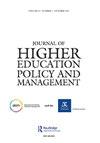The role of the university environment in shaping education and employment inequalities
IF 2.7
3区 教育学
Q1 EDUCATION & EDUCATIONAL RESEARCH
Journal of Higher Education Policy and Management
Pub Date : 2023-02-28
DOI:10.1080/1360080X.2023.2180170
引用次数: 0
Abstract
ABSTRACT Life course theory posits that social, structural, and cultural contexts shape individuals’ life outcomes. Using this theory, we investigated whether inequalities in education and employment outcomes for young people with marginalised identities are shaped by the university environment they attended. Based on UK national statistics, universities with similar social, cultural, economic, and physical environments were clustered. These clusters were linked to the Longitudinal Study of Young People in England (LSYPE) cohort dataset to determine whether different university environments predicted differences in outcomes. We observed a mixed picture with no definitive pattern for any marginalised identity. Social and economic environments played a role in predicting education outcomes of young people. Social, cultural, and economic environments were important in predicting employment outcomes. The physical environment did not have any impact. This research emphasises a need for more creative policies within certain universities that address education and employment inequalities.大学环境在形成教育和就业不平等方面的作用
生命历程理论认为,社会、结构和文化背景塑造了个体的生活结果。利用这一理论,我们调查了具有边缘化身份的年轻人在教育和就业结果方面的不平等是否受到他们所就读的大学环境的影响。根据英国国家统计数据,社会、文化、经济和自然环境相似的大学聚集在一起。这些集群与英国年轻人纵向研究(LSYPE)队列数据集相关联,以确定不同的大学环境是否会预测结果的差异。我们观察到一幅复杂的画面,没有任何边缘化身份的明确模式。社会和经济环境在预测年轻人的教育成果方面发挥了作用。社会、文化和经济环境是预测就业结果的重要因素。物理环境没有任何影响。这项研究强调,某些大学需要制定更具创造性的政策来解决教育和就业不平等问题。
本文章由计算机程序翻译,如有差异,请以英文原文为准。
求助全文
约1分钟内获得全文
求助全文
来源期刊

Journal of Higher Education Policy and Management
EDUCATION & EDUCATIONAL RESEARCH-
CiteScore
5.30
自引率
7.70%
发文量
52
期刊介绍:
The Journal of Higher Education Policy and Management is an international journal of professional experience and ideas in post-secondary education. It is a must read for those seeking to influence educational policy making. The journal also aims to be of use to managers and senior academic staff who seek to place their work and interests in a broad context and influence educational policy and practice.
 求助内容:
求助内容: 应助结果提醒方式:
应助结果提醒方式:


